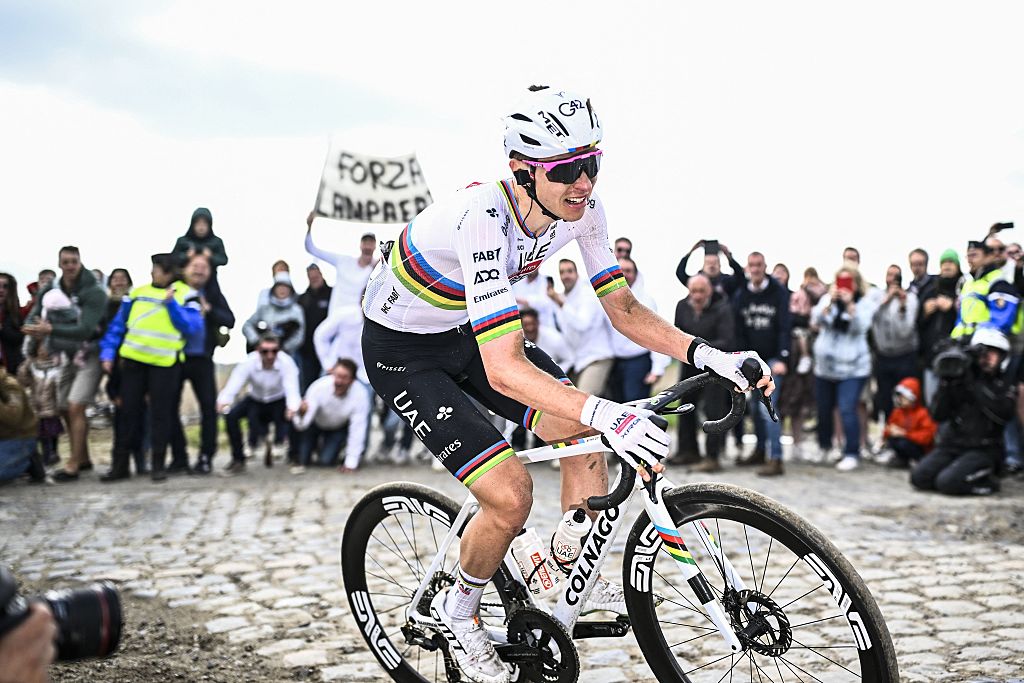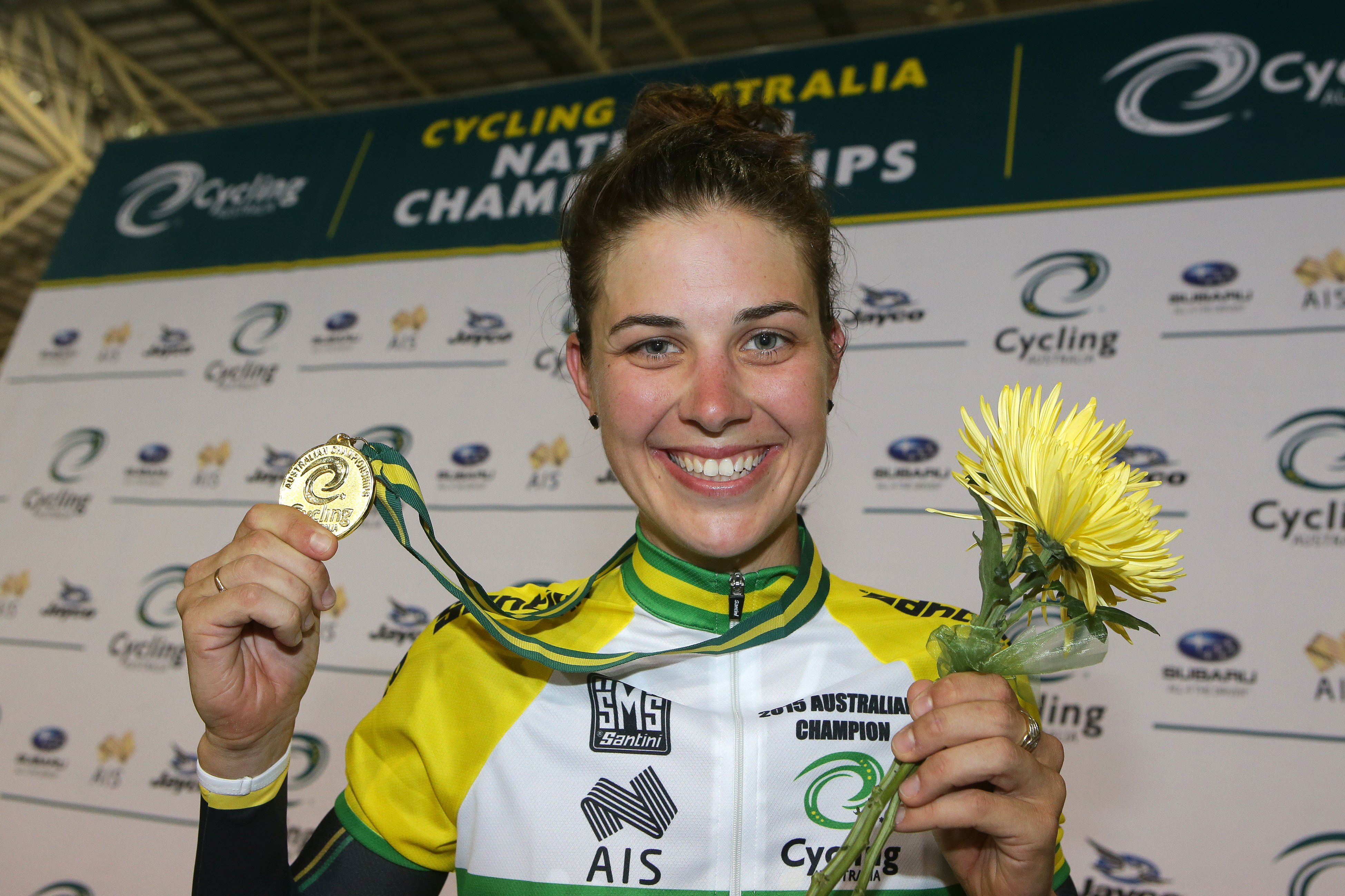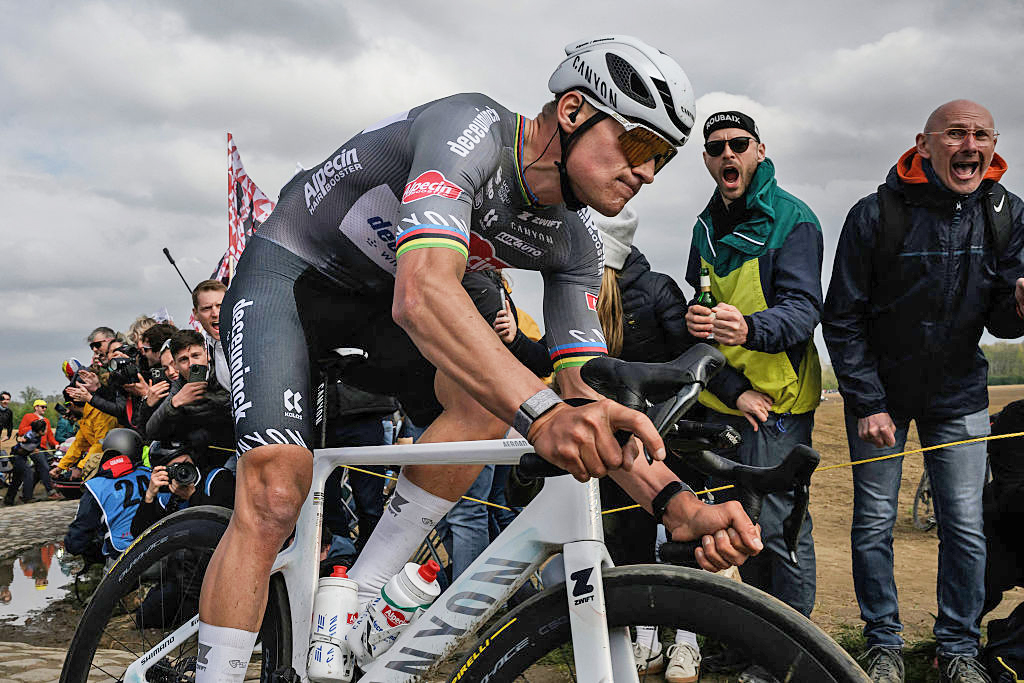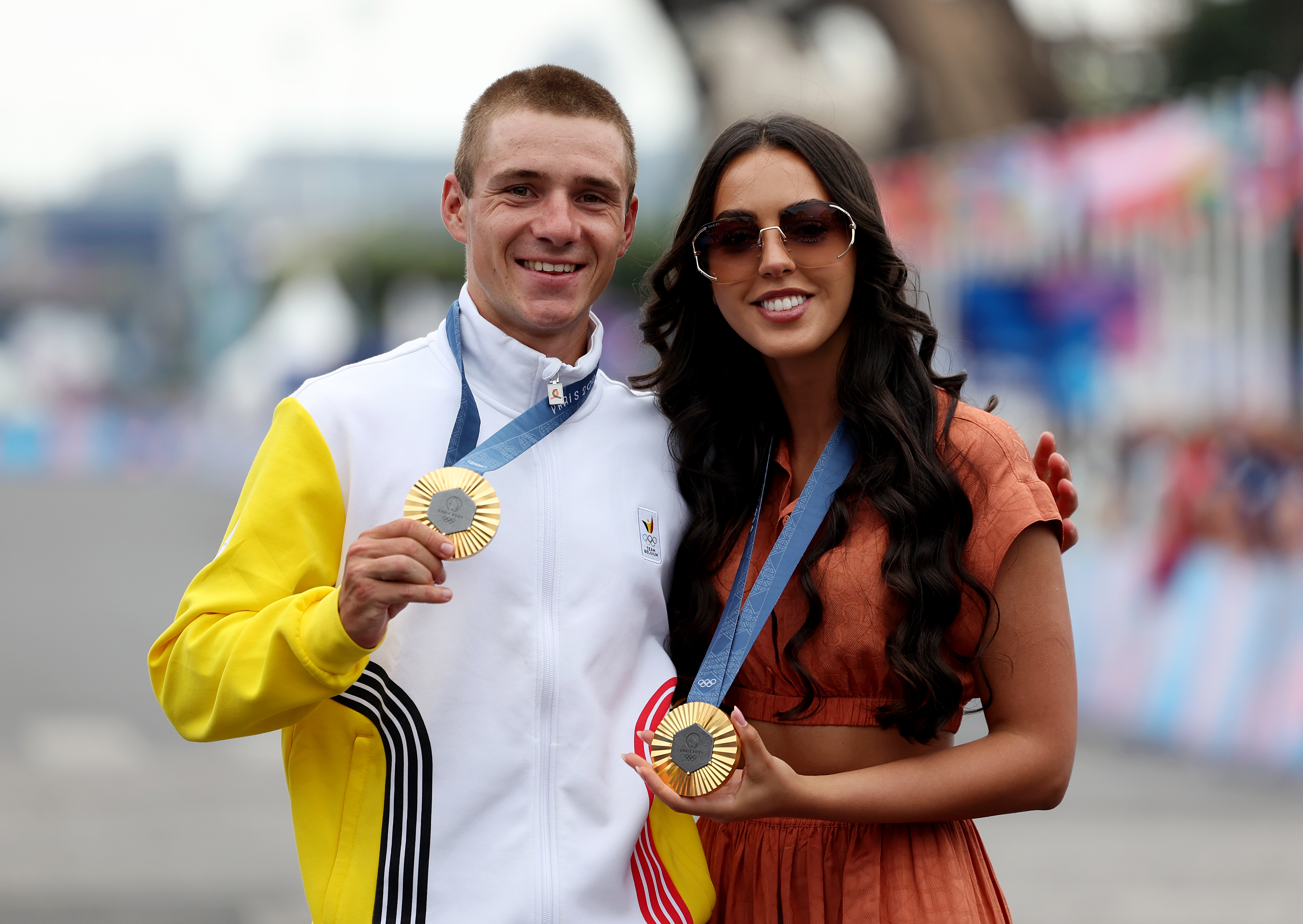Tour de France 2021: The Essential Race Guide
All you need to know, from the contenders to race and stage-by-stage analysis
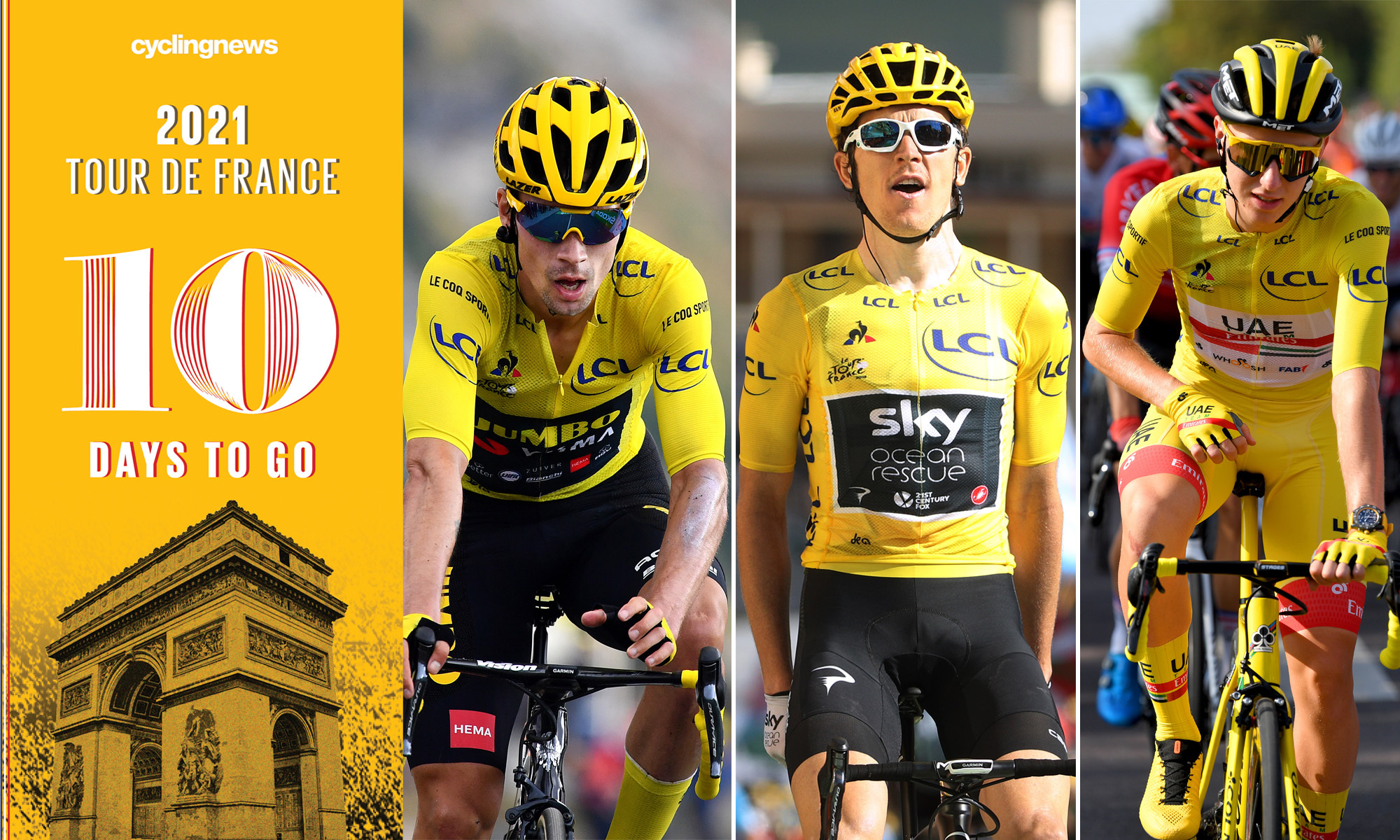
The 2021 Tour de France is almost upon us with the Grand Départ set for June 26, and 21 mouth-watering stages to look forward to as the race takes in Brittany, two individual time trials, a double assault on Mont Ventoux and the customary finish on the Champs Élysées in Paris on July 18.
The 108th edition of the race will see defending champion Tadej Pogačar (UAE Team Emirates) aim to defend his crown against Primoz Roglič (Jumbo-Visma), Geraint Thomas (Ineos Grenadiers) and a host of other yellow jersey contenders over what is an intriguing and multi-layered route profile.
After a mountain-heavy Tour de France in 2020, race organisers ASO have opted for a more traditional and classic affair this time around, with the race reverting to hosting two long individual time trials for the first time since 2013.
In fact, on the face of it, the profile and route of the 2021 edition of the Tour de France is somewhat of a throwback to a Jean-Marie Leblanc style of race – in that the route suits a strong time triallist and puts the pure climbers on the back foot almost immediately. However, there are deeper levels and dimensions to Christian Prudhomme’s opus.
There are just three summit finishes in total, 58km of time trialling – a lot for a modern-day Tour – and eight stages for the sprinters. Prudhomme has also moved away from packing the route with a barrage of new climbs or prolonged periods in the Jura, Massif Central or Vosges mountain regions.
That being said, Prudhomme has cleverly concocted a route that marries some of the most iconic of French cycling furniture – Mount Ventoux, Brittany, the Col de Port, Pau, and the Tourmalet – and blended those ingredients with several truly engaging aspects.
There may only be three summit finishes, and many of the staple Alpine climbs are missing, but there are stages that could be defined just as much for their descents as the climbs they included, with ASO attempting to nullify the typically late mountain-top attacks by encouraging riders to go on the offensive even earlier.
Prudhomme may have built this Tour on traditional foundations, with two days in the Alps and five in the Pyrenees, but he has also taken risks too – something Leblanc rarely did. His 2021 route is peppered with stages that could easily be turned upside down by crosswinds and potential ambushes, especially around Narbonne, Nimes, and Carcassonne. The four days in Brittany – although a replacement for the Copenhagen Grand Départ – could see the race lead change almost daily, while the first time trial on stage 5 has enough road to create a pecking order and draw out the climbers ahead of the Alps.
Overall, this is a route that perhaps doesn’t ignite the immediate excitement or glamour that some of Prudhomme’s recent ventures have. Ventoux aside, there are no gimmicks, but this is still a highly engaging route and one that provides all the landscape the riders need to make compelling Tour de France.
The Tour de France contenders – Pogačar, Roglič and Ineos
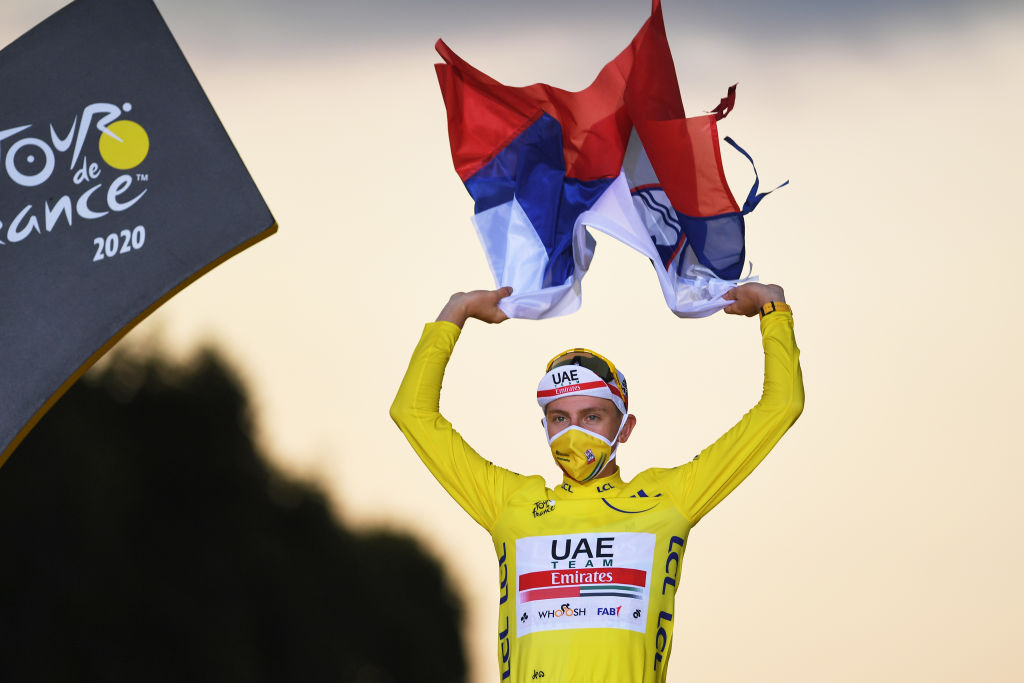
Tadej Pogačar (UAE Team Emirates) comes into the race as the reigning champion so the young Slovenian starts his Tour defence under completely different circumstances to last year, when he was somewhat of an underdog. His smash and grab at La Planche des Belle Filles last summer was nothing short of astonishing but it’s fair to say that he benefitted from the fact that he and his team didn’t need to control any of the race. Instead, they wisely allowed Jumbo-Visma to wear themselves out, but this time around Pogačar will not be afforded such comforts and from the moment he arrives in Brest for the Grand Départ the entire race will be watching his every move.
That said, Pogačar’s UAE Team Emirates squad are far from average. In Marc Hirschi, David de la Cruz, Brandon McNulty, Davide Formolo, and Rafal Majka, the defending champion has the core of an excellent team. They aren’t the strongest team in the race but they don’t necessarily have to be.
On paper, Pogačar’s main threat is the rider he crushed in the final time trial last year, Primoz Roglič. The Jumbo-Visma leader has spent the last few months secluded up at altitude, shunning the standard pre-Tour race programme for a tailor-made and extended period of training. He has not been seen at a race since Liège-Bastogne-Liège back in late April but the 31-year-old will no doubt bring his best condition to the race. There are reasonable questions over the current form of his team but while the Dutch outfit may not have the same sparkle they had last year, they are far from mediocre, with Sepp Kuss, Wout van Aert and Steven Kruijswijk providing worthy cover.
The strongest ensemble in this year’s race comes from Ineos Grenadiers who line up with 2018 winner Geraint Thomas, Richard Carapaz and Richie Porte among their cast. The British team, smarting from last year’s defeat, will be looking to win back-to-back Grand Tours after Egan Bernal’s Giro d’Italia success in May, and while they do not have a contender as lethal as Pogačar or Roglič, their collective muscle could be just as important. When the leading group are down to 10 riders in the mountains it’s possible that half of that contingent could be made up of Ineos riders and that's a level of dominance that cannot be ignored. Roglič and Pogačar cannot chase every move and while attacking might be the Slovenian pair’s best form of defense, they could just as easily become isolated.
For Ineos Grenadiers, the dilemma comes in the form of which leader to back. Thomas has the better Tour record, of that there’s no doubt, but he looked below his best at the Dauphiné while Carapaz dominated the Tour de Suisse. Porte is somewhat of a dark horse but the two time trials along the route probably edge Thomas ahead in the team pecking order.
Outside of the Ineos, UAE and Jumbo stables, there are a number of overall contenders with hopes of challenging for the podium. Marc Soler, Enric Mas, Miguel Angel Lopez and Alejandro Valverde are in line for protected spots at Movistar – although it’s surely Mas who leads the line after his fifth place last year. Julian Alaphilippe will shoulder Deceuninck QuickStep’s ambitions but will once again be forced to fend for himself in the mountains, while Rigoberto Uran (EF Education-Nippo) looks to be back to his 2017 level when he finished on the podium.
There are three Australians – leaving Porte aside – with genuine top-ten hopes. Ben O’Connor has finished top ten in his last two weeklong WorldTour stage races and it’s little wonder that AG2R Citroën recently extended his contract. Lucas Hamilton has been given the responsibility of leading Team BikeExchange's GC bid with Simon Yates targeting stage wins, while Jack Haig was fifth in the recent Dauphiné and has an in-form Bahrain Victorious at his disposal.
Wilco Kelderman forms part of a very strong Bora-Hansgrohe squad that includes Emanuel Buchmann and Patrick Konrad, and Nairo Quintana (Arkéa-Samsic) remains a threat even if his star has been waning for some time.
Along with Alaphilippe, the French have real hope via Guillaume Martin (Cofidis), who looks to be peaking on time this year after he faded in the second half of last year’s race, but it’s David Gaudu at Groupama-FDJ who instills the most belief from the home nation. With Thibaut Pinot still on the sidelines, Gaudu has the chance to stake his claim as a Tour de France contender in his own right. He was mightily impressive at the Vuelta last year, winning two stages and finishing eighth overall. This year the 24-year-old has been consistent and the next natural progression for him would be a top-five in Paris.
Israel Start Up-Nation arrives at the race with Michael Woods as their protected GC asset. That leaves four-time Tour winner Chris Froome to act in the unfamiliar role of road captain.
Below those riders there are a number of talented outsiders worth watching, with Pello Bilbao (Bahrain Victorious), Jakob Fuglsang (Astana-Premier Tech), Esteban Chaves (Team BikeExchange), Michael Woods (Israel Start–Up Nation), Tao Geoghegan Hart (Ineos Grenadiers), Dan Martin (Israel Start–Up Nation) and Warren Barguil (Arkéa-Samsic) are all flying under the radar.
The Tour de France sprinters – Ewan, Démare, Merlier, Cavendish or Bennett?
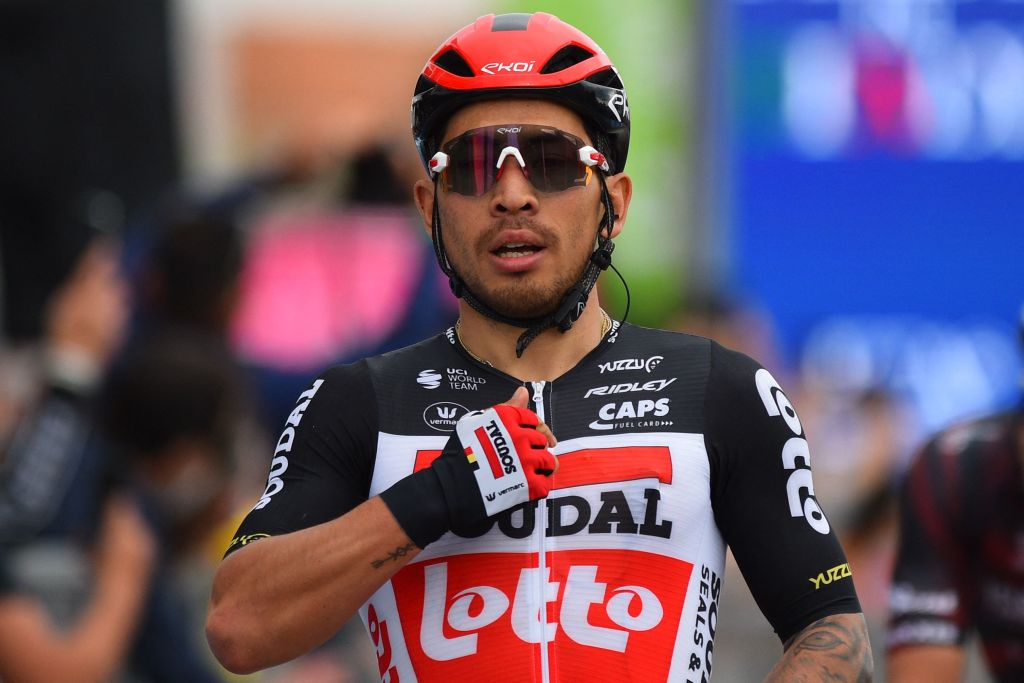
With up to eight stages within this year’s race intended for the sprinters, there’s no hiding away from the fact that the fastest riders in the world will be hogging their fair share of headlines in this year’s race. The first dedicated sprint stage arrives on stage three and other than the block of stages in the Pyrenees, the rest of the flat days are liberally dotted throughout weeks 1, 2, and 3.
There are question marks over the participation of Sam Bennett, who is still recovering from a knee injury, and while Deceuninck-QuickStep boss Patrick Lefevere publicly announced that he has no ‘plan B,’ that’s not strictly true. Mark Cavendish – a 30-time stage winner – is waiting in the wings and after his recent exploits in Belgium, he looks like the fiery, competitive rider of old. Michael Mørkøv needs someone to lead out after all, and if Bennett proves unable to prove his fitness in time, the veteran Manxman could prove the perfect tonic for Lefevere’s unease.
The fastest rider in the race, however, is likely to be Caleb Ewan, who looks like a prime contender for the green jersey, let alone a stage win or two. The Australian has almost the entire Lotto Soudal team at his disposal and, after his double at the Giro d’Italia, looks well on course to add to his tally of five Tour stages.
When it comes to the WorldTour, Arnaud Démare has been a pale imitation of the rider who dominated the Giro sprints last year but his flat-track bully performances in recent months suggest that the Groupama-FDJ rider is approaching something like his best form just in time. Tim Merlier looks like a rider to watch after his stunning start to the year, while his Alpecin-Fenix teammate and leader Mathieu van der Poel can no doubt play a part on any stage that isn’t in the mountains or a time trial.
Wout van Aert (Jumbo-Visma) can sprint with the best riders but his disrupted run-in and operation to remove his appendix has left question marks over his condition. Even a Van Aert at 80 per cent is a threat but Peter Sagan – the seven-time Green jersey winner – remains the biggest threat for Bennett’s title defence if the Irishman does make it to Brest. Sagan won a stage in the Giro and the points competition and, despite Bora-Hansgrohe’s insistence on stacking a team with climbers, looks like the favourite for all but the flattest of stages. Sonny Colbrelli has never won a Grand Tour stage but was in blistering form at the recent Dauphiné, while Jasper Philipsen
(Alpecin-Fenix), Alexander Kristoff (UAE Team Emirates), Mads Pedersen (Trek–Segafredo), Nacer Bouhanni (Arkéa-Samsic), Michael Matthews (Team BikeExchange) and Bryan Coquard (B&B Hotels p/b KTM) are all worth a mention.
The Tour de France Route – a stage by stage guide
All times local – CEST. All finish times according to the earliest predicted schedule.
Stage 1 / Saturday June 26 / Brest - Landerneau, 197.8km / Times: 12:10 - 17:00
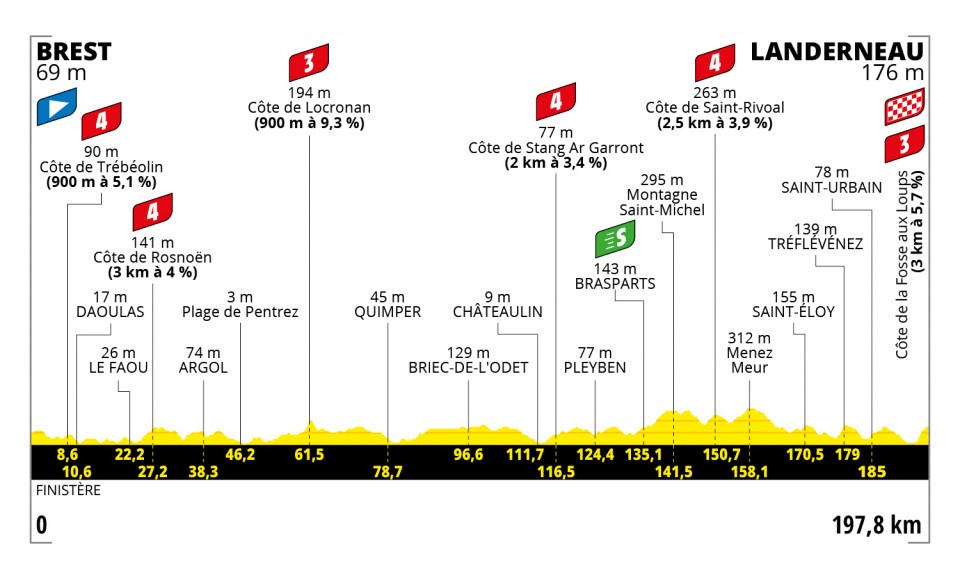
The 2021 Tour de France kicks off with what could be a thrilling stage between Brest and Landerneau. This is the first time since 2008 that the Tour has started in Brest but rather than opting for a prologue or short time trial ASO have decided to cram six climbs within the opening 197.8km of this year’s race. Although none of the ascents will worry the peloton too much, this has all the makings of a difficult day in the saddle with the pace likely to be relentless throughout. With no yellow jersey or pecking order established, tensions will run high, while the added complication from possible cross-winds will leave several overall contenders nervous.
Crashes, splits and tactical mistakes will all play a part but the gradient on the final climb does at least ease in the final 500 metres before the line. That said, many of the pure sprinters will have been distanced by that point and it should be a puncheur who comes out on top to take the stage and the first maillot jaune of this year’s race.
Stage 2 / Sunday June 27 / Perros-Gueirec - Mûr-de-Bretagne, 183.5km / Times: 13:10 - 17:30
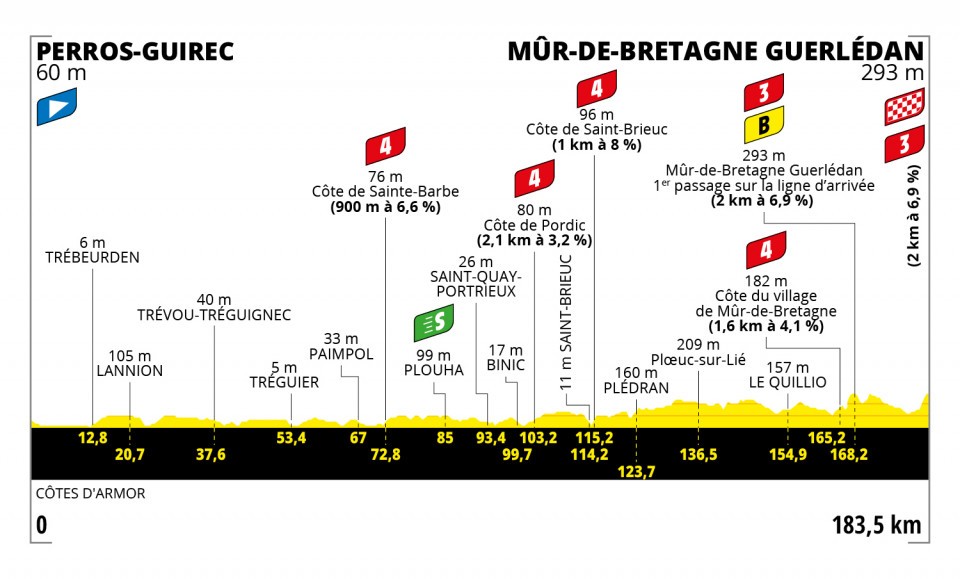
Stage 2 of the Tour de France is a day of two halves. Unlike the opening day of racing, when the climbs were evenly spread out, stage 2 between Perros-Guirec and the top of the Mur-de-Bretagne has most of the six categorised climbs crammed into the second half of the stage, with two ascents of the Mur-de-Bretagne thrown in for good measure. That said, there’s relatively little in the way of flat roads between the start and the first climb at 72.8 kilometres.
The finale is technical and we’re likely to see the same riders who contested stage 1 once again take centre stage. Assuming the peloton starts the final climb in one piece, the gaps between the overall contenders should be relatively small come the line but last time the race finished here, back in 2018, Daniel Martin attacked with around one kilometre to go and everyone of the top-three finishers in Paris lost time. Once again, this isn’t a day for the peloton to relax.
Stage 3 / Monday June 28 / Lorient - Pontivy, 182.9km / Times: 13:10 - 17:24
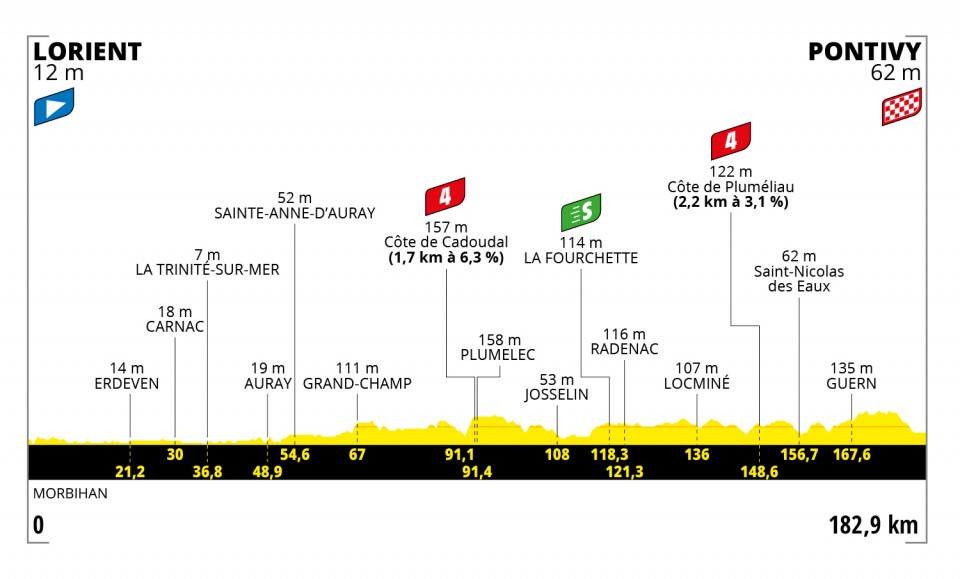
After two days that catered for the puncheurs the sprinters of this year’s Tour de France will be finally let off the leash. The stage departs Lorient, the hometown of former King of the Mountains winner Warren Barguil, but that’s where any attention directed towards the talismanic Frenchman ends, with the race hugging the coastline before heading inland, through the department of Morbihan, but before reaching the finish in Pontivy the peloton must climb the Côte de Cadoudal – known as the Breton Alpe d’Huez – and where stages have taken place in both 2008 and 2015. All the fine-tuning and training before the race will count for little in the heat of the finale and with such a huge prize up for grabs it may well come down to which sprinter, and his leadout, make the fewest mistakes.
Stage 4 / Tuesday June 29 / Redon - Fourgères, 150.4km / Times: 13:25 - 16:52

The Tour de France’s mini Tour of Brittany ends on stage 4 with another outing for the sprinters. At just 150.4 kilometres in length, this is shorter than the previous day and its part of ASO’s plan to increase the intensity within the race on days that might ordinarily set out as slow burners before igniting in a fierce sprint battle to the line. There are no categorised climbs to speak of between the start in Redon and the finish in Fougeres but this is a must-watch stage nonetheless. The entire stage takes place in the Ille-et-Vilaine region. The last time the race ended in Fougeres was in 2015 with Mark Cavendish taking the stage. It’s an identical finish this time around with the sprinters set to enjoy their second straight day of action before the stage 5 time trial.
Stage 5 / Wednesday June 30 / Changé - Laval, 27.2km / Times: 12:15 - 16:50
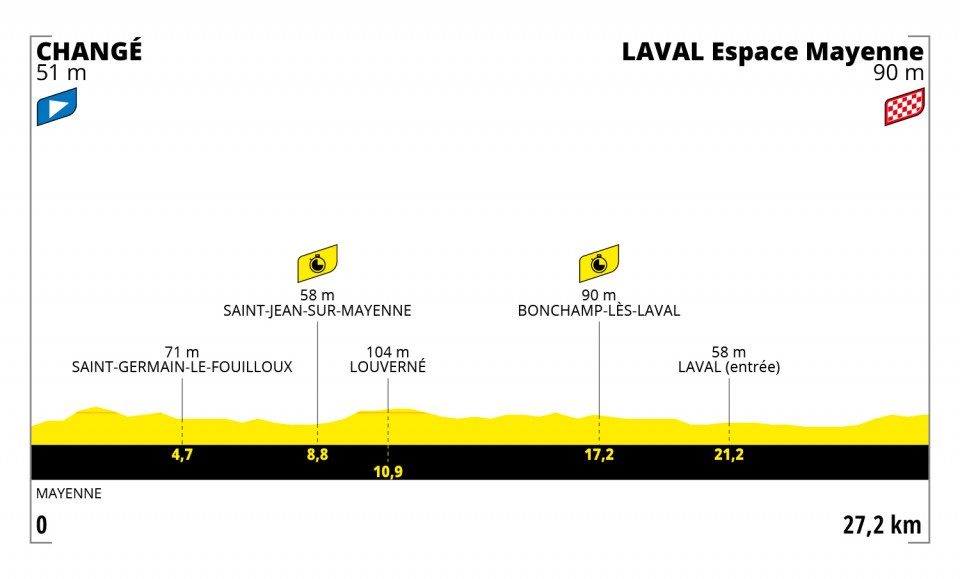
The Tour de France leaves Brittany on stage 5 and shifts up a gear with the first of two time trials in this year’s race, and while the opening two stages may have provided brief glimpses of a fight for the yellow jersey the 27.2 kilometre test between Changé and Laval Espace Mayenne will cause major changes to the overall standings. This is the longest individual time trial the Tour de France has held in the opening week since the 2008 edition. That year a vast amount of time separated the top contenders with the top 20 riders spread out over approximately a minute and a half and, in a race that has so far been judged by seconds, the aftershocks from this stage could determine the pattern of racing for the next two weeks.
Stage 6 / Thursday July 1 / Tours - Chàteauroux, 160.6km / Times: 13:55 - 17:26
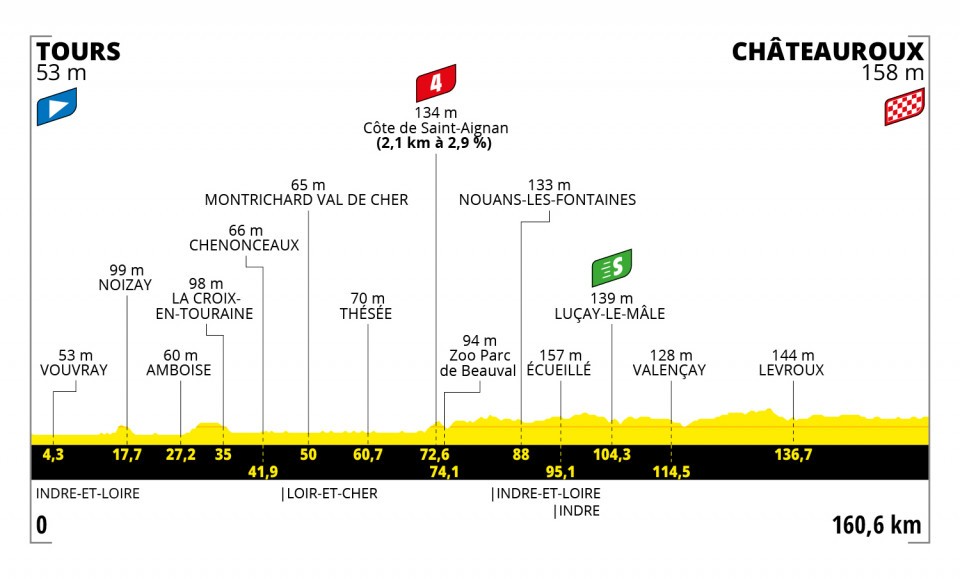
After the stage 5 time trial and a reshuffling at the top of the overall standings the attention turns back to the sprinters. However, while the stage profile looks tailor-made for the fastmen, with a limited amount of climbing on the menu, there is a threat of crosswinds and echelon action in this region if the winds pick up.
The 160.6 kilometre stage leaves Tours and heads east. For the first few hours of racing there should be very little to trouble the peloton as the race heads out of the cathedral city and ventures into picture-postcard châteaux and vineyard country. This should be a day for the sprinters, and Mark Cavendish won his first-ever Tour stage in the finish town of Châteauroux back in 2008.
Stage 7 / Friday July 2 / Vierzon - La Creusot, 249.1km / Times: 11:00 - 17:05
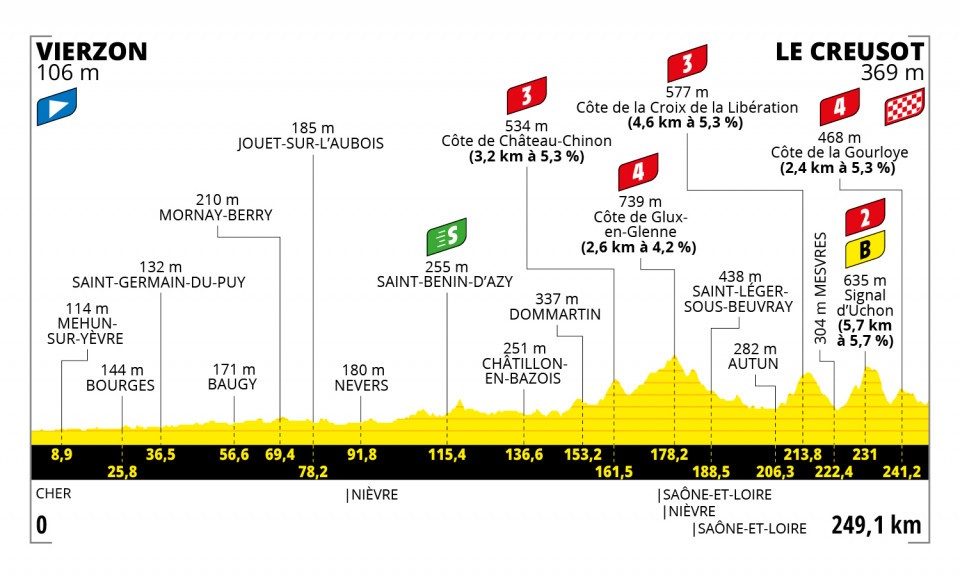
Stage 7 of the Tour de France is a day that should be finely balanced between a break succeeding or a reduced group of all-rounders deciding the day’s honours. The stage, which sees the race head east from Vierzon is the longest Tour stage in 21 years, totalling a whopping 249.1 kilometres.
This may not look like a day for the GC riders but this has potential ambush written all over it. The distance, coupled with the demanding second half will ensure only a small group contest the finish, and we could potentially see yet another change in race leadership.
Stage 8 / Saturday July 3 / Oyonnax - Le Grand Bornand, 150.8km / Times: 13:10 - 17:06
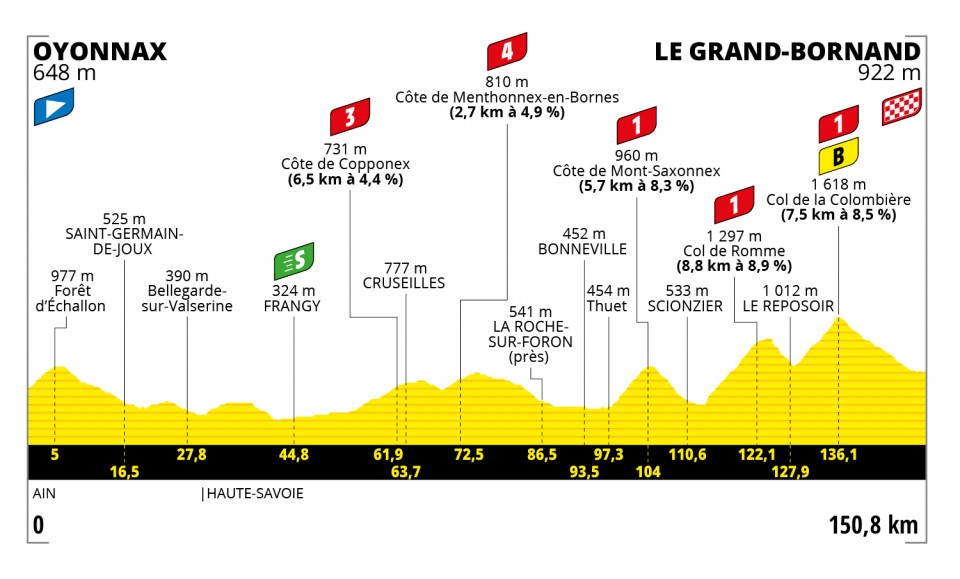
The hills on stage 7 were mere an appetizer for what’s in store on stage 8 of the Tour de France as the race heads into the Jura and Alpine mountain ranges for the first time this year. There may not be a summit finish in store for the peloton but with five categorised climbs, plus an uncategorised uphill start, this will be a rude awakening for the riders after a week of relatively flat racing broken up by the odd short, sharp ascent.
The stage culminates with the first category ascent of the Col de la Colombière and a finish at Le Grand-Bornand but before then the peloton will tackle some rugged terrain and obstacles in just 150.8 kilometres of racing.
The addition of the Cote de Mont-Saxonnex, new compared to the 2018 version of this finale, just adds another level of difficulty to the stage. Back in 2009, when the race also climbed the Romme-Colombière combo several GC contenders, including Lance Armstrong, were dropped with Frank Schleck taking the honours.
Stage 9 / Sunday July 4 / Cluses - Tignes, 144.9km / Times: 13:00 - 17:30
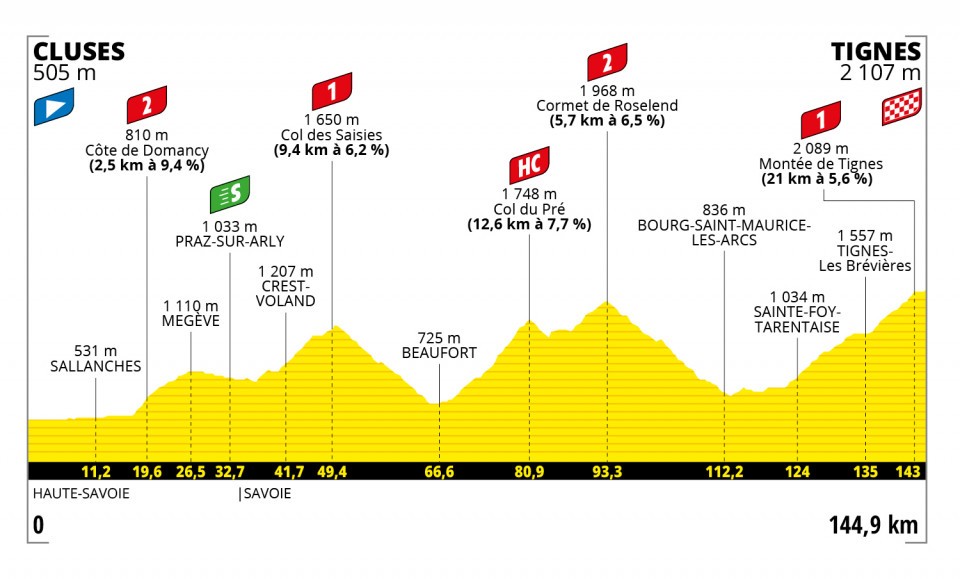
Two years after a stage on the Tour de France to Tignes was washed away by flash floods ASO have made true on their promise of bringing the race back, and this should be another mountain blockbuster with five climbs peppered along the 144.9-kilometre route between Cluses and the ski station at Tignes.
After taking in some of the most stunning scenery of the race so far the riders begin the long descent down into Bourg-Saint-Maurice followed by the long steady climb of the Montée de Tignes. It’s 21 kilometres in length and starts off relatively steadily but as the road continues the climb the gradient really digs in around the point of the Les Brevières. This a brute of a climb and the gaps between the overall contenders could stretch into minutes, and while this isn’t a summit finish – with the road flattening out with 2 kilometres to go – it’s still the hardest stage of the Tour so far.
Rest day 1 / Monday July 5
Stage 10 / Tuesday July 6 / Albertviille - Valence, 190.7km / Times: 13:05 - 17:23
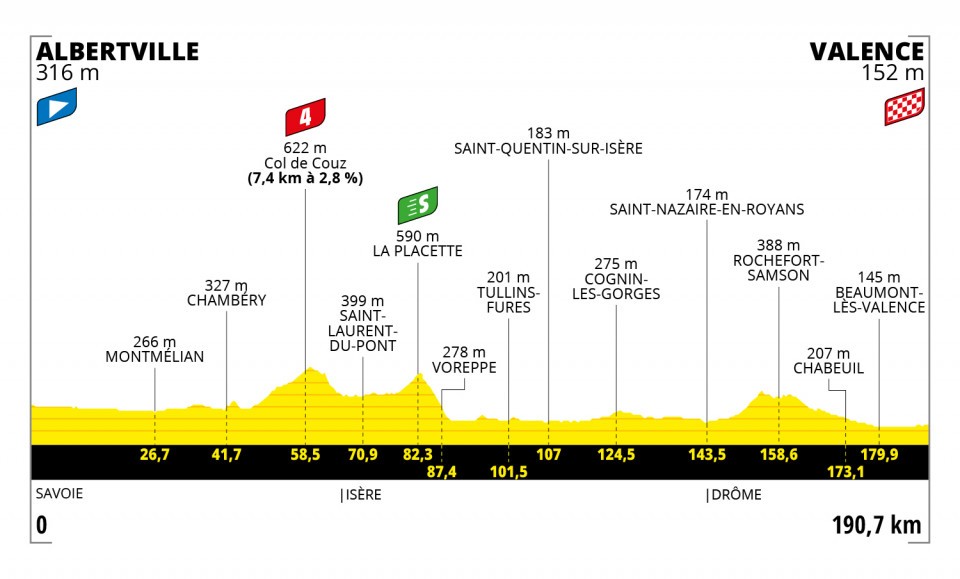
Following the first rest day in this year’s Tour de France the racing recommences with a 190.7km stage from Albertville to Valence. The race takes us away from the Alps and it’s a day for the sprinters but the threat of potential crosswinds and echelons in the final part of the stage makes this anything but an easy day in the saddle. Michael Matthews won a stage in these parts back in 2017, beating Edvald Boasson Hagen and John Degenkolb to the line in Romans sur Isère, on a day that was also hit by crosswinds. That day Chris Froome and Team Sky put Dan Martin and Alberto Contador to the sword and even though their time losses were manageable every second counts at this point.
However, assuming that the sprinters’ teams remain in contention this could be a hugely important day in the battle for the Green jersey with a flat run into Valence perfectly suited to a bunch gallop. Chepe González – who certainly wasn’t a sprinter – won from a breakaway in Valence all the way back in 1996.
Stage 11 / Wednesday July 7 / Sorgues - Malaucène, 198.9km / Times: 12:00 - 17:18
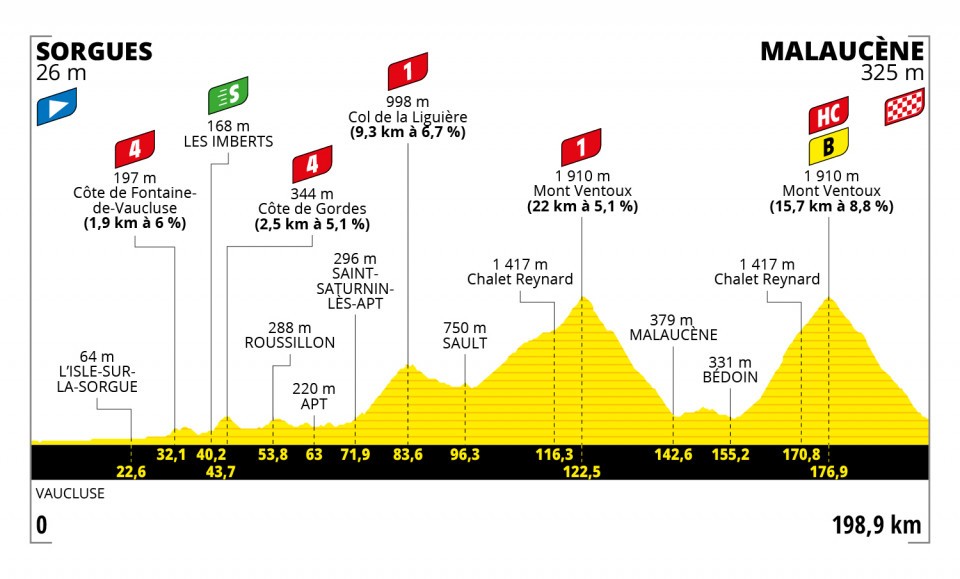
Stage 11 is all about the climbers with the race taking on the highly anticipated doubled ascent of Mont Ventoux. Before the riders get to the first ascent they leave Sorgues and take on two small fourth category climbs, the Cote de Fontaine-de-Vaucluse followed by the first category Col de la Liguière. The riders will then descend into Sault before beginning the first ascent of ‘the Giant of Provence’. The first time up takes the easiest of three possible routes to the top but it’s also the longest, with 24.3 kilometres of climbing facing the riders.
The toughest gradient come into view around Chalet Reynard with the riders emerging from the tree-covered landscape and reaching the barren slopes that make Mont Ventoux so revered. At the summit the riders drop down into Malaucène for the first time via one of the fastest descents they’ll face in the entire race before taking a short uncategorised climb to Bédoin and then the final ascent of the Ventoux. At 15.7 kilometres long, and with an average 8.8 per cent, the road is simply relentlessly steep from the very start. At Chalet Reynard they hit the roads they climbed earlier before cresting the summit and taking on a second breakneck descent into Malaucène for the finish.
Stage 12 / Thursday July 8 / Saint-Paul-Trois-Châteaux - Nîmes, 159.4km / Times: 13:30 - 17:12
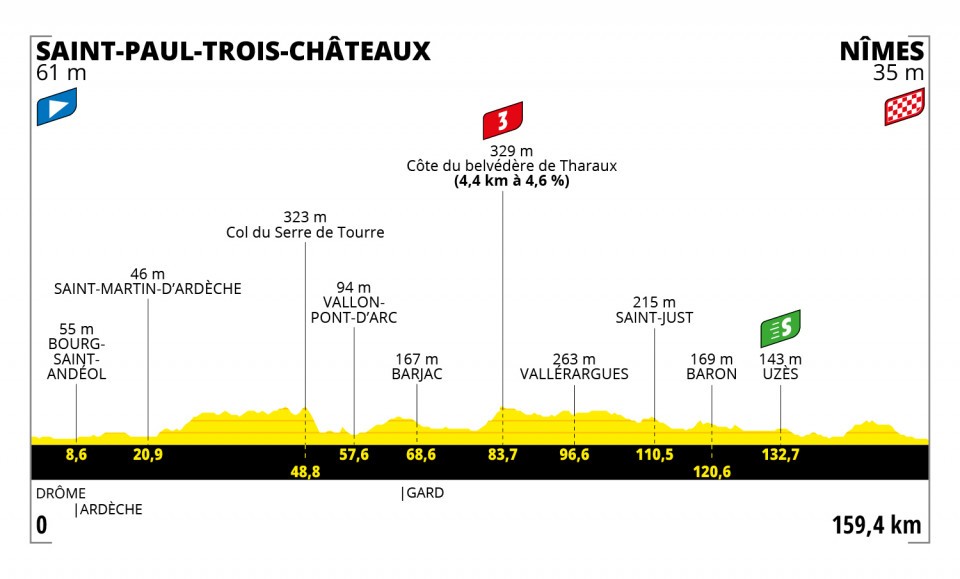
After the double ascent of Mont Ventoux on stage 11 the race returns to less testing terrain with a 159.4 kilometre stage from Saint-Paul-Trois-Châteaux to Nîmes. As with stage 10, however, appearances can be deceptive and despite only one short climb positioned mid-way through the stage there’s another chance that echelons and crosswinds could play their part in proceedings. At Vallon Pont d’Arc the stage heads south and into the Gard department.
The exposed roads at this point could be a key if the wind picks up before the peloton hits the third cat climb of the Côte du Belvédère de Tharaux. With less than 30 kilometres to go the road heads due south to Nîmes for the expected bunch sprint, where Alexander Kristoff and Caleb Ewan are both past winners. This could be either a relatively quiet day in the Tour or one of the most intense battles of the race so far.
Stage 13 / Friday July 9 / Nîmes - Carcassonne, 219.9km / Times: 12:05 - 17:15
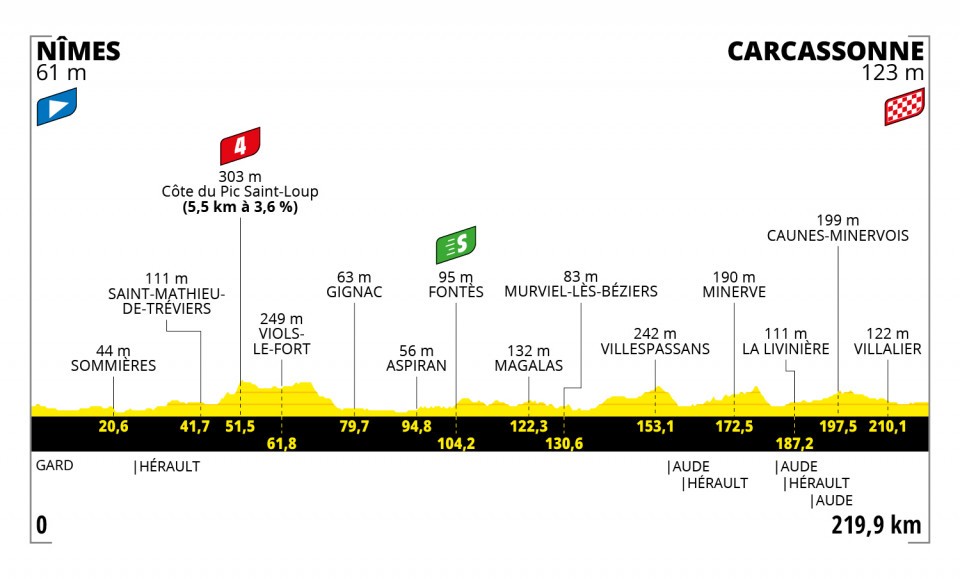
After finishing in Nimes on stage 12, the riders still left in the Tour de France will leave the same city in the Occitanie region of southern France and head towards the historical city of Carcassonne. On paper this looks like a relatively straightforward transition stage as the race tip-toes towards the Pyrenees but the finer details of this 219.9 kilometre jaunt tell a different story. Once more the threat of crosswinds loom large and while there is only one fourth category climb between the start and Carcassonne the majority of route is rolling. It’s no coincidence that no stage has ever ended in a bunch sprint in Carcassonne with Magnus Cort Nielsen winning from the break last time the race reached the walls of the medieval citadel that dominate the hill-top town, back in 2018.
Stage 14 / Saturday July 10 / Carcassonne - Quillan, 183.7km / Times: 12:15 - 16:48
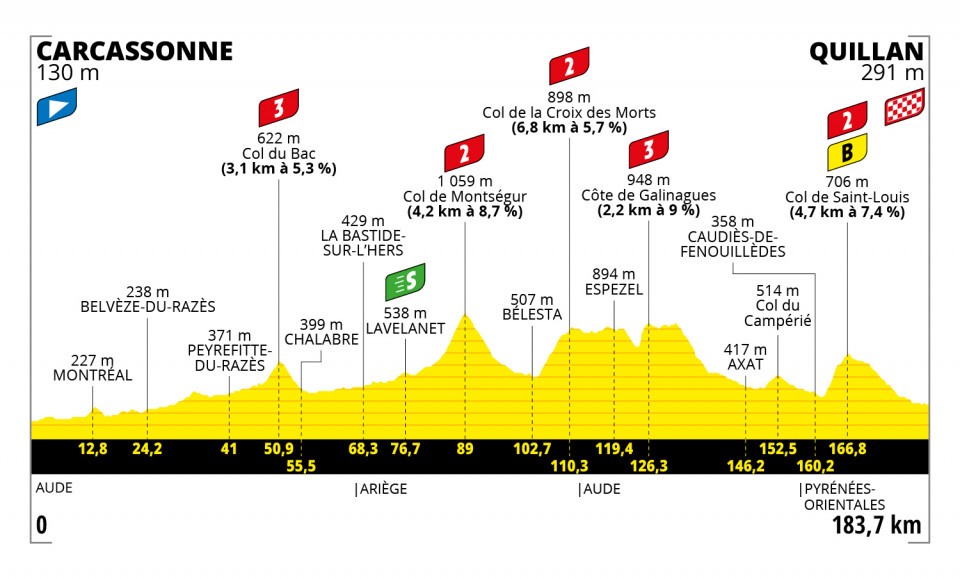
For a second day in a row the Tour de France departs from the previous day’s finish and stage 14 of the race heads out of Carcassonne for a 183.7 kilometre journey south to the small town of Quillan. On paper this looks like a nailed on day for the breakaway with five categorised climbs peppering the route all the way towards the 17 kilometre descent from the top of the last ascent into the finishing town. The most likely scenario will see the sprinters’ teams sit back after the last few days of hostilities while the GC riders opt for a calm day given what’s ahead of them in the coming days.
The stage could be decided by the final climb of the stage, the Col de Saint-Louis. The ascent is 4.7 kilometres long and has an average gradient of 7.4 per cent and will provide the perfect launch pad for the remnants of the break to attack each other before the final descent to the line.
Stage 15 / Sunday July 11 / Céret - Andorre-La-Vieille, 191.3km / Times: 12:20 - 17:28
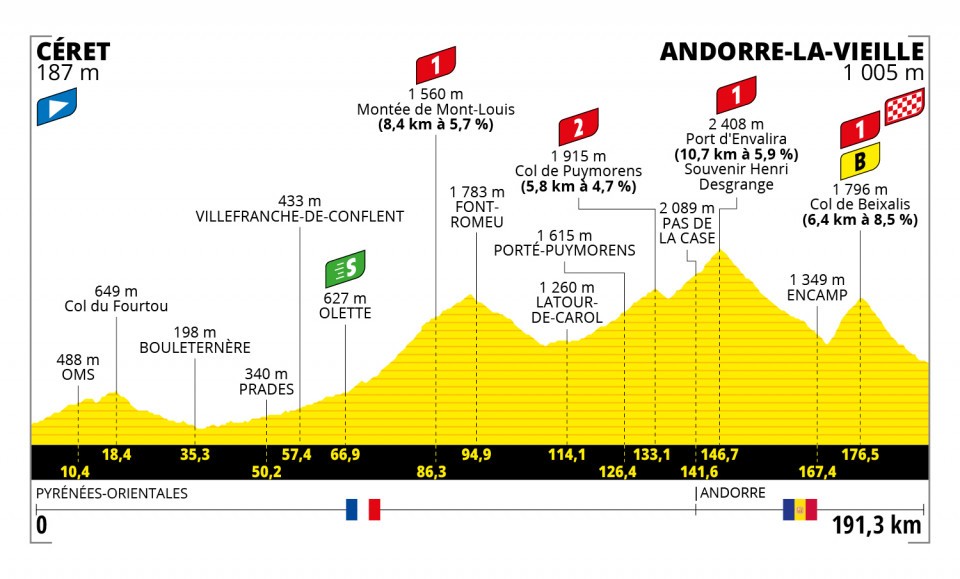
Stage 15 from Ceret to Andorre-La-Vieille is one of the hardest in this year’s race. There are four categorised climbs along the 191.3 kilometre route but three of them are first category ascents, while the riders will reach the highest point in this year’s race, topping out at over 2,400 metres. What’s more the final climb of the day, the Col de Beixalis, has the potentially to blow the entire race apart. From the intermediate sprint at Olette the road continues to climb towards the summit of the Montee de Mont-Louis.
A descent follows but there’s little valley road before the riders begin to climb the secondary Cole de Puymorens – a 5.8 kilometre climb with an average gradient of 4.7 per cent. That climb will bring the riders to just under 2,000 metres, and there’s only a short descent before the first category climb of the Port d’Envalira – with the Souvenir Henri Desgrange going to the first rider to reach the Tour’s highest point. The following descent brings the race deep into Andorra before the assault of the Col de Beixalis looms into view. At the summit the road plummets back towards the centre of Andorra with a steep and highly technical descent towards the line.
Rest day 2 / Monday July 12
Stage 16 / Tuesday July 13 / Pas de la Case - Saint-Gaudens, 169km / Times: 13:05 - 17:21
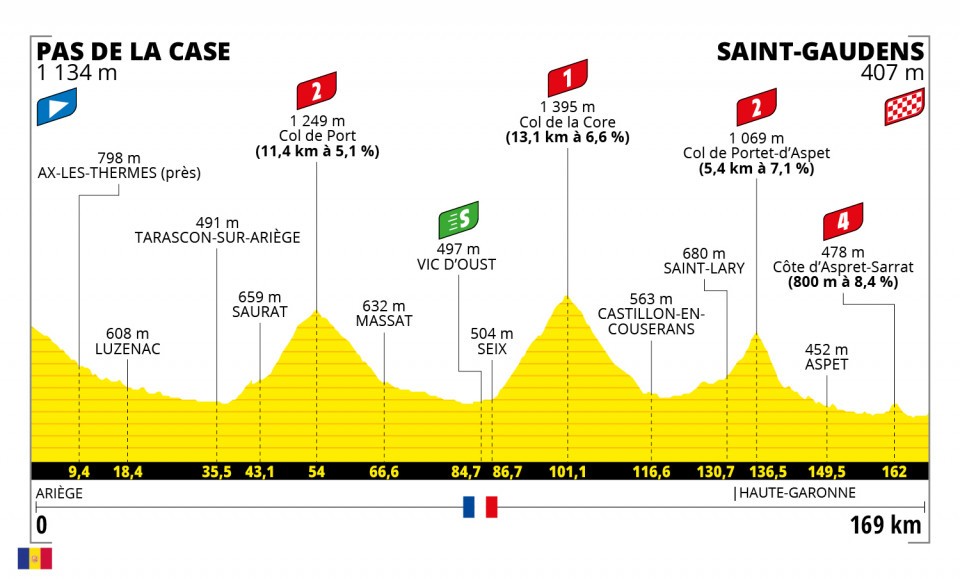
Stage 16 sees the race head back into France, and while the 169 kilometre jaunt from Pas de la Case to Saint-Gaudens is far from easy, the profile suggest that the win could be decided by a break. That said, racing after a rest-day can often throw up some surprises and if one of the riders in the top-ten is showing any signs of weakness or fatigue, expect no mercy from their rivals. After the Col de la Core the riders will descend into the valley before hitting the Col de Portet-d’Aspet. They then descend – passing the Fabio Casartelli memorial – before the last and shortest climb of the day, the Côte d’Aspret-Sarrat. It’s only 800 metres in length but there are certainly some difficult stretches and with the finish just a few kilometres away it should provide an excellent launchpad for any last minute attacks.
Stage 17 / Wednesday July 14 / Muret - Saint-Lary-Soulan Col du Portet, 178.4km / Times: 11:50 - 16:49
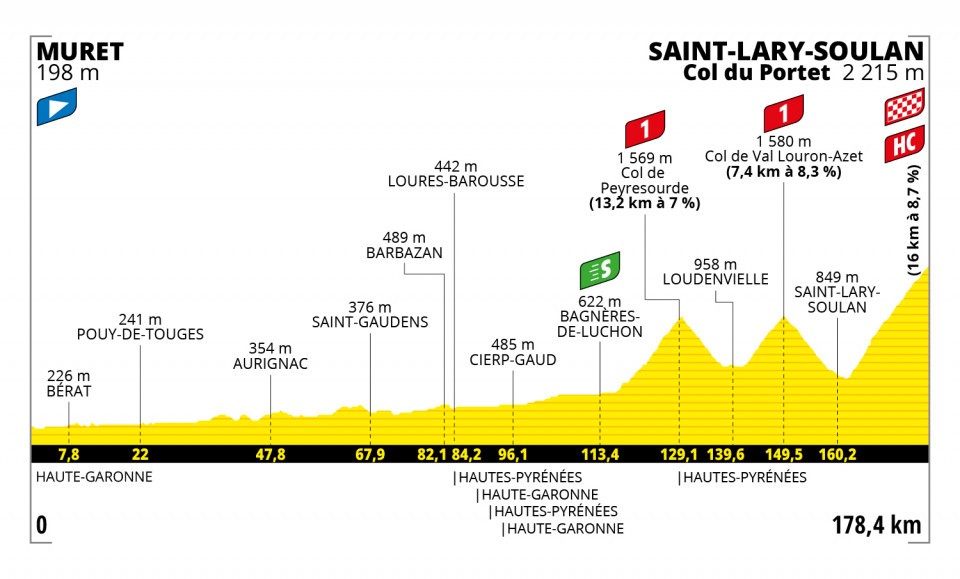
The Col du Portet, first introduced to the Tour de France in 2018, returns this year and comes at the end of a crucial day in the Pyrenees. Starting in Muret, the route heads southwest and the opening 115 kilometres or so are relatively flat until the peloton reach Bagnères-de-Luchon – exactly where the 2018 Tour stage started. From there the riders will on the first of three major ascents with the Col de Peyresourde first up. The riders will then make a breakneck descent into Loudenvielle before tackling the Col d’Avet. It’s shorter than the Peyresourde but with a gradient averaging 8 per cent it’s a severe test.
Another fast but this time technical descent follows before the road kicks up for the final climb and the summit finish atop the Col du Portet. The 16-kilometre ascent suits the lightweight pure climbers perfectly with a tough opening section as the road climbs towards Espiaube. At that point the gradient briefly eases before the riders turn right, thus avoiding the road towards Pla d’Adet, and take on a relentless section of switchbacks. The gradient reaches over 10 per cent in the final kilometre and the time gaps here could be race defining.
Stage 18 / Thursday July 15 / Pau - Luz Ardiden, 129.7km / Times: 13:35 - 17:19
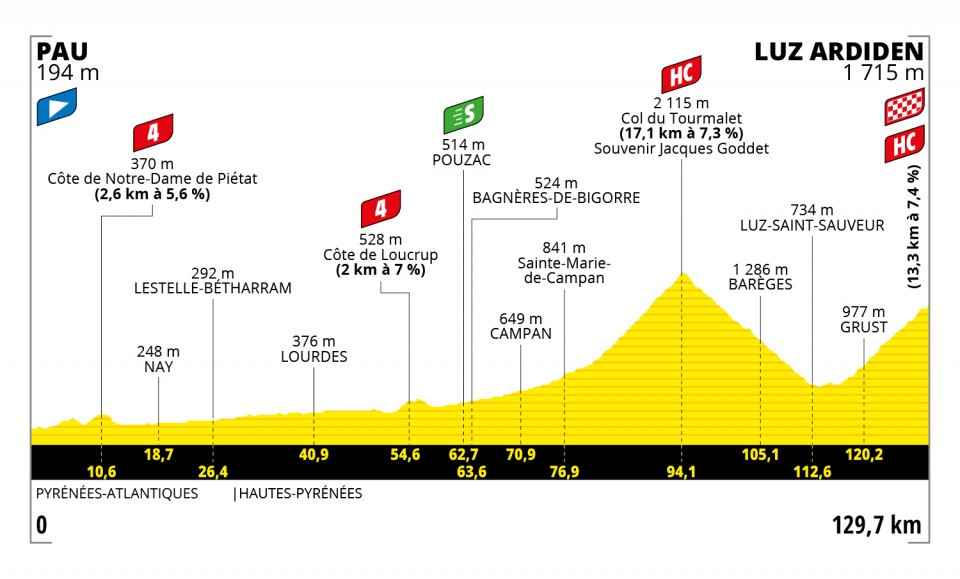
Stage 18, the final mountain stage of this year’s Tour de France is arguably one of the hardest days in the race, with two massive Pyrenean climbs – the Col du Tourmalet and a blockbuster finish at the top of Luz Ardiden. What’s more, the stage is just 129.7 kilometres in length, meaning that there will be little to no respite.
There are two small fourth category ascents in the first 54 kilometres of racing – the Côte de Notre-Dame de Pietat, and the Côte de Loucrup, before an intermediate sprint at Pouzac From there the race heads through Bagnères-de-Bigorre and gently rises south through Campan and Saint-Marie-de-Campan before the race really starts on the slopes of the Col du Tourmalet. There’s then a rapid descent through Barèges and into Luz-Saint-Sauveur before the race reaches the Pont du Napoleon bridge. The riders then start the second straight HC-category climb of the day to the summit of Luz Ardiden. The climb is 13.3 kilometres in length, and while the opening few hundred metres are relatively easy the climb ramps up drastically after the first kilometre.
Stage 19 / Friday July 16 / Mourenx - Libourne, 207km / Times: 12:20 - 17:06
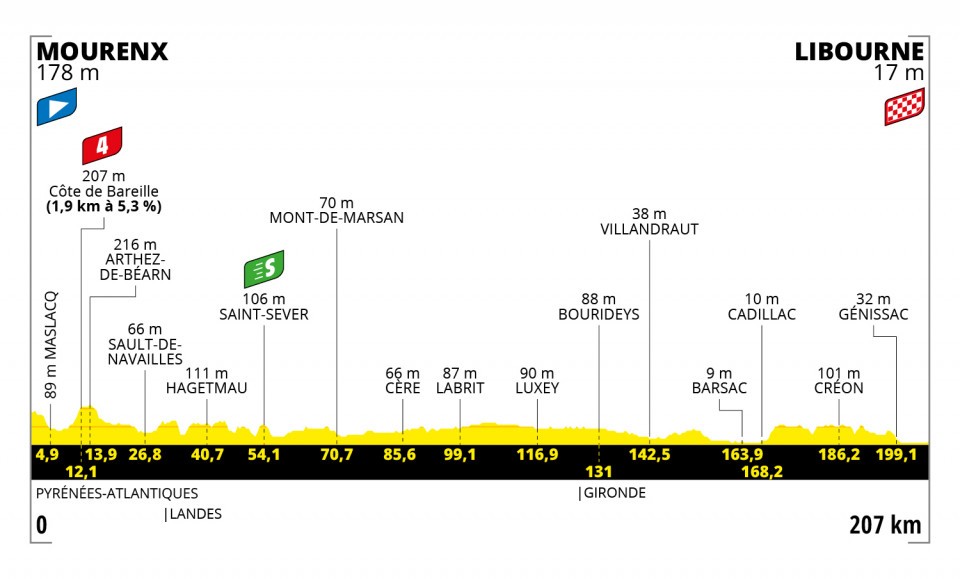
With the Pyrenees in the rearview the attention turns back to the sprinters on stage 19 with a 207 kilometre stage from Mourenx to Libourne. However it will be a tough day for the sprinters to control. The distance, coupled with the fact that peloton will be exhausted from five days in the mountains, will leave a number of teams somewhat unwilling to control a peloton for a long day in the saddle. This could also be the last chance for teams without a sprinter or a GC rider to potentially rescue their race and with a lumpy opening 50 kilometres a bunch sprint is far from a certainty.
Stage 20 / Saturday July 17 / Libourne - Saint-Emilion, 30.8km / Times: 13:05 - 17:19
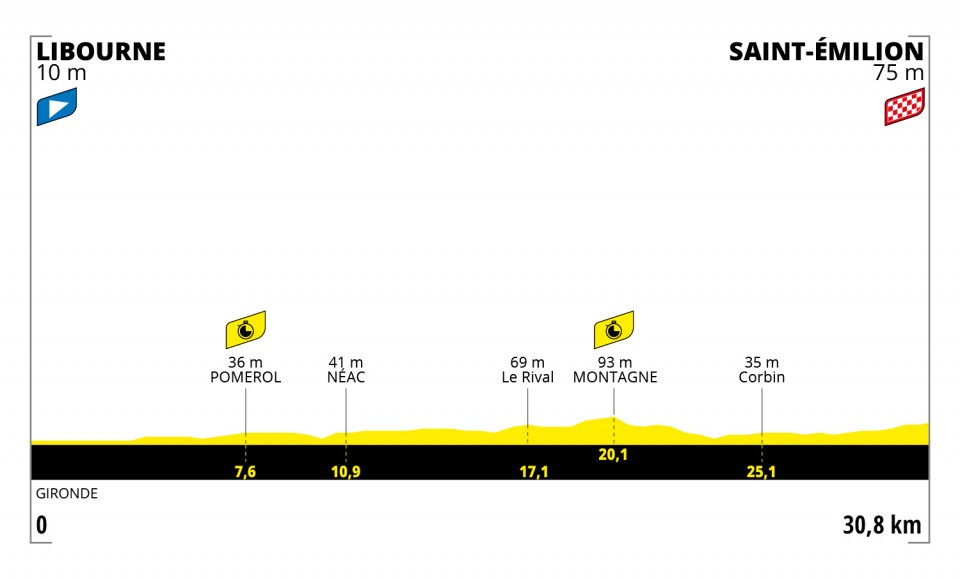
At 30.8 kilometre in length, the individual test between Libourne and Saint-Emilion is a flat affair with small rises and long drags that will perfectly suit the time trial specialists.
This is the course for the power specialists and even the technical sections along the route should be no problem for them. Any concerns will be purely reserved for the climbers, who after three weeks of racing could see their advantages obliterated in a painfully short amount of time.
Stage 21 / Sunday July 18 / Chatou - Paris Champs-Élysées, 108.4km / Times: 16:15 - 19:00
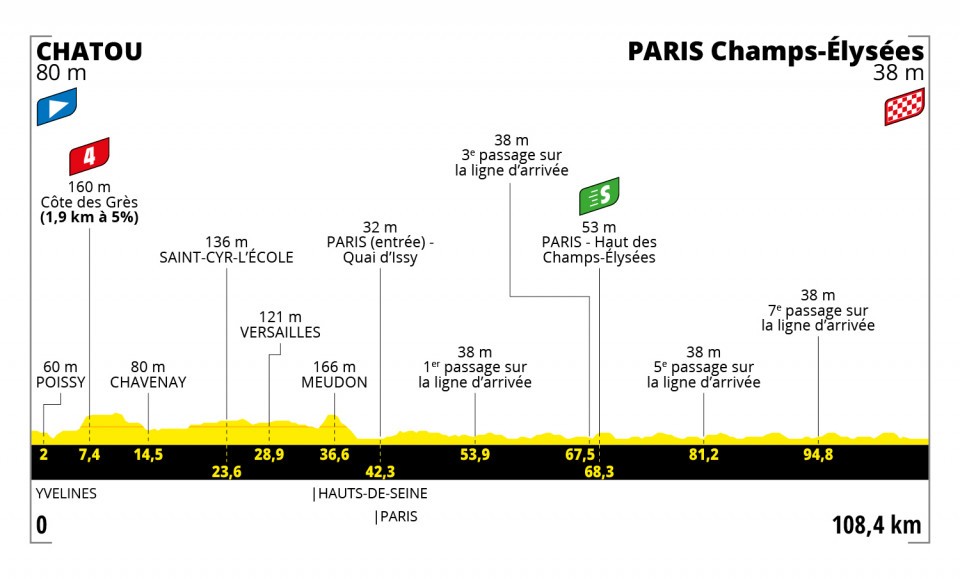
After three weeks of drama and excitement the Tour de France arrives in Paris for the final stage and a showdown between some of the best sprinters in the world on the Champs-Élysées. For the fourth year in a row the final stage of the race starts in Chatou, just west of the capital, but the route initially heads east for a brief while before doubling back on itself. At this point the pace will be relaxed with teams and riders soft-pedalling through the opening kilometres and using the opportunity to celebrate their achievements and reaching Paris to complete the Tour.
How to watch the 2021 Tour de France – live TV and streaming
Read on to find out how to watch the Tour de France via live stream, no matter your location, with ExpressVPN.
The 2021 Tour de France will be broadcast around Europe and Eurosport. A subscription to Eurosport Player costs £6.99 for a single month, £4.99 for a year-long monthly pass, or £39.99 for a 12-month pass.
GCN+ will also air the race in the UK and in select other territories around Europe. A year’s subscription to GCN+ now costs £39.99 / €39.99 / $49.99 after the end of a promotional price in February.
ITV4 will also be showing the race in the UK, with full full live coverage and highlights available. In Wales, S4C will be airing the race.
The Tour de France will be available to view in the USA on Peacock Premium. A seven-day free trial is available, while a subscription to Peacock Premium will set you back $4.99 (or $9.99 without ads) per month.
FloBikes will air the Tour de France in Canada. An annual subscription will set you back $149. SBS will air the race in Australia.
Around Europe, broadcasters include France TV in France, ARD in Germany, Sporza and RTBF in Belgium, Rai in Italy, and RTVE in Spain
If you live outside a broadcast zone or are on holiday outside your country and find that the live streams to be geo-restricted, you can get around this by getting access to them by simulating being back in your home country via a 'virtual private network', or VPN, for your laptop, tablet or mobile.
Our sister site TechRadar tested hundreds of VPNs and recommends the number-one VPN currently available as Express VPN. With ExpressVPN, you can watch on many devices at once including Smart TVs, Fire TV Stick, PC, Mac, iPhone, Android phone, iPads, tablets, etc.
Get The Leadout Newsletter
The latest race content, interviews, features, reviews and expert buying guides, direct to your inbox!
Daniel Benson was the Editor in Chief at Cyclingnews.com between 2008 and 2022. Based in the UK, he joined the Cyclingnews team in 2008 as the site's first UK-based Managing Editor. In that time, he reported on over a dozen editions of the Tour de France, several World Championships, the Tour Down Under, Spring Classics, and the London 2012 Olympic Games. With the help of the excellent editorial team, he ran the coverage on Cyclingnews and has interviewed leading figures in the sport including UCI Presidents and Tour de France winners.
Latest on Cyclingnews
-
Paris-Roubaix defeat only confirms Tadej Pogačar's greatness – Opinion
Slovenian's multitude of talents make him the best of his generation and an example for the sport to follow -
Melissa Hoskins' death was a 'tragic accident' says victim impact statement heard in emotional court hearing, Rohan Dennis' lawyer requests suspended sentence
Judge Ian Press to sentence Dennis on May 14, 2025 -
UCI, Alpecin-Deceuninck to pursue bidon thrower 'so that such behaviour is severely punished'
Mathieu van der Poel's team: 'misbehaviour of a few individuals can have far-reaching consequences' -
'Without you, I would probably have stopped my career' – Remco Evenepoel thanks wife Oumi in emotional post ahead of return from 'dark period'
Olympic champion primed for first race since October at Friday's Brabantse Pijl after 'the hardest battle of my life so far'

